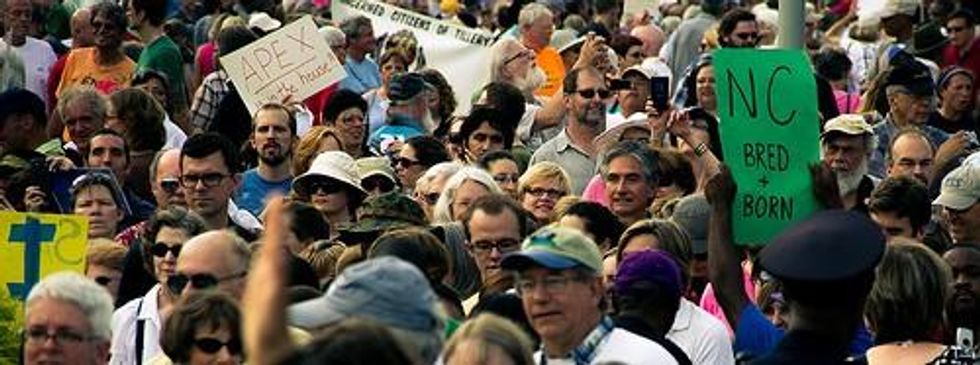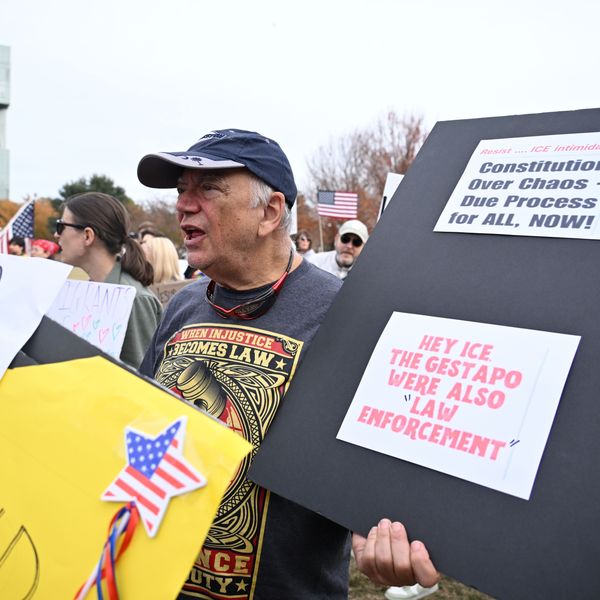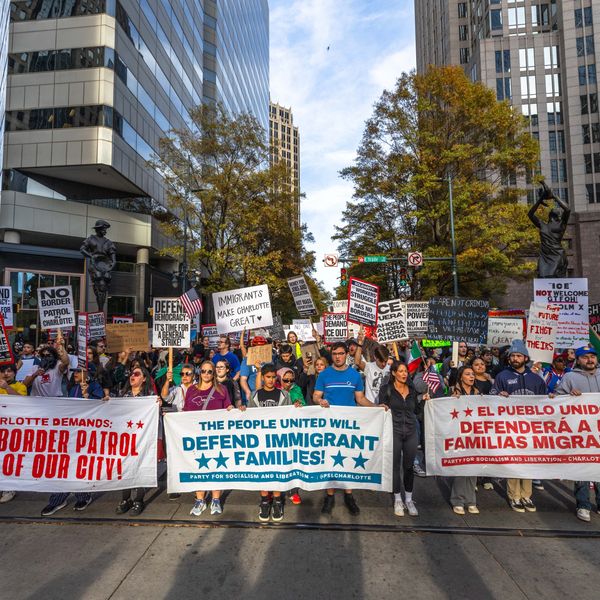North Carolina Throws Out Racial Justice Act
Governor's latest move is a blow to faith, labor, and community groups fighting to keep the limited protection for people on death row

The only such law in the U.S., the act allowed people on death row to seek a reduced sentence to life without parole if they could demonstrate that their trials were tainted by racism.
The move defies the mass movements that have swept the state--firing up faith, labor, and civil rights and black freedom groups--demanding that this limited protection stay.
Since the law was passed in 2009, four inmates have had their sentences converted from death to life in prison after proving racial bias. After Wednesday's repeal, defendants sentenced to death by a racist court will no longer be spared.
"By repealing this law barely four years into its existence, North Carolina's leadership has willfully turned its back on widespread evidence of systemic racial bias that needs to be addressed--not ignored," declared Sarah Preston, Policy Director for the American Civil Liberties Union of North Carolina.
Governor Pat McCrory's move will allow him to fast track the executions of the over 152 people on North Carolina's death row by removing 'road blocks', reports NBC. The conservative governor has been eager to drive through the executions since taking office, and the bill has been under attack by conservatives since it passed, the New York Times reports.
When Republicans took over the legislature in 2010, they sprinted to pass a series of laws to erode workers' protections, medicaid, early voting, and school funding. They succeeded in limiting the Racial Justice Act by ruling that statistics cannot be used when determining racial bias. Its all-out eradication will end what is being referred to as a 'defacto moratorium' on executions in the state since 2006.
The Racial Justice Act is the latest casualty in what many declare is an all-out assault on the people of North Carolina.
The repercussions will reach far in a state where racial bias has profound impacts on court rulings. Several peer-reviewed academic studies have exposed rampant racism in North Carolina's criminal justice system. A Michigan State University study found that, if the victim is white, the defendant is 2.6 times more likely to be sentenced to death.
Seth Kotch and Robert Mosteller write in the North Carolina Law Review that "race and the death penalty have been constant companions" throughout North Carolina's histories of slavery, lynchings, and Jim Crow, continuing to the present-day.
The ACLU explains that racial biases are prevalent throughout the state's courts, from the selection of juries to the charges defendants face.
Since April, hundreds from North Carolina's faith, labor, and community groups have launched Monday protests and civil disobedience outside of the North Carolina legislature against the GOP's war on the limited protections to poor people and people of color throughout the state. Under the banner "Moral Mondays,' protesters have demanded an end to the attack on the Racial Justice Act, and hundreds have been faced arrest. This past Monday saw 84 arrests.
_____________________
An Urgent Message From Our Co-Founder
Dear Common Dreams reader, The U.S. is on a fast track to authoritarianism like nothing I've ever seen. Meanwhile, corporate news outlets are utterly capitulating to Trump, twisting their coverage to avoid drawing his ire while lining up to stuff cash in his pockets. That's why I believe that Common Dreams is doing the best and most consequential reporting that we've ever done. Our small but mighty team is a progressive reporting powerhouse, covering the news every day that the corporate media never will. Our mission has always been simple: To inform. To inspire. And to ignite change for the common good. Now here's the key piece that I want all our readers to understand: None of this would be possible without your financial support. That's not just some fundraising cliche. It's the absolute and literal truth. We don't accept corporate advertising and never will. We don't have a paywall because we don't think people should be blocked from critical news based on their ability to pay. Everything we do is funded by the donations of readers like you. Will you donate now to help power the nonprofit, independent reporting of Common Dreams? Thank you for being a vital member of our community. Together, we can keep independent journalism alive when it’s needed most. - Craig Brown, Co-founder |

The only such law in the U.S., the act allowed people on death row to seek a reduced sentence to life without parole if they could demonstrate that their trials were tainted by racism.
The move defies the mass movements that have swept the state--firing up faith, labor, and civil rights and black freedom groups--demanding that this limited protection stay.
Since the law was passed in 2009, four inmates have had their sentences converted from death to life in prison after proving racial bias. After Wednesday's repeal, defendants sentenced to death by a racist court will no longer be spared.
"By repealing this law barely four years into its existence, North Carolina's leadership has willfully turned its back on widespread evidence of systemic racial bias that needs to be addressed--not ignored," declared Sarah Preston, Policy Director for the American Civil Liberties Union of North Carolina.
Governor Pat McCrory's move will allow him to fast track the executions of the over 152 people on North Carolina's death row by removing 'road blocks', reports NBC. The conservative governor has been eager to drive through the executions since taking office, and the bill has been under attack by conservatives since it passed, the New York Times reports.
When Republicans took over the legislature in 2010, they sprinted to pass a series of laws to erode workers' protections, medicaid, early voting, and school funding. They succeeded in limiting the Racial Justice Act by ruling that statistics cannot be used when determining racial bias. Its all-out eradication will end what is being referred to as a 'defacto moratorium' on executions in the state since 2006.
The Racial Justice Act is the latest casualty in what many declare is an all-out assault on the people of North Carolina.
The repercussions will reach far in a state where racial bias has profound impacts on court rulings. Several peer-reviewed academic studies have exposed rampant racism in North Carolina's criminal justice system. A Michigan State University study found that, if the victim is white, the defendant is 2.6 times more likely to be sentenced to death.
Seth Kotch and Robert Mosteller write in the North Carolina Law Review that "race and the death penalty have been constant companions" throughout North Carolina's histories of slavery, lynchings, and Jim Crow, continuing to the present-day.
The ACLU explains that racial biases are prevalent throughout the state's courts, from the selection of juries to the charges defendants face.
Since April, hundreds from North Carolina's faith, labor, and community groups have launched Monday protests and civil disobedience outside of the North Carolina legislature against the GOP's war on the limited protections to poor people and people of color throughout the state. Under the banner "Moral Mondays,' protesters have demanded an end to the attack on the Racial Justice Act, and hundreds have been faced arrest. This past Monday saw 84 arrests.
_____________________

The only such law in the U.S., the act allowed people on death row to seek a reduced sentence to life without parole if they could demonstrate that their trials were tainted by racism.
The move defies the mass movements that have swept the state--firing up faith, labor, and civil rights and black freedom groups--demanding that this limited protection stay.
Since the law was passed in 2009, four inmates have had their sentences converted from death to life in prison after proving racial bias. After Wednesday's repeal, defendants sentenced to death by a racist court will no longer be spared.
"By repealing this law barely four years into its existence, North Carolina's leadership has willfully turned its back on widespread evidence of systemic racial bias that needs to be addressed--not ignored," declared Sarah Preston, Policy Director for the American Civil Liberties Union of North Carolina.
Governor Pat McCrory's move will allow him to fast track the executions of the over 152 people on North Carolina's death row by removing 'road blocks', reports NBC. The conservative governor has been eager to drive through the executions since taking office, and the bill has been under attack by conservatives since it passed, the New York Times reports.
When Republicans took over the legislature in 2010, they sprinted to pass a series of laws to erode workers' protections, medicaid, early voting, and school funding. They succeeded in limiting the Racial Justice Act by ruling that statistics cannot be used when determining racial bias. Its all-out eradication will end what is being referred to as a 'defacto moratorium' on executions in the state since 2006.
The Racial Justice Act is the latest casualty in what many declare is an all-out assault on the people of North Carolina.
The repercussions will reach far in a state where racial bias has profound impacts on court rulings. Several peer-reviewed academic studies have exposed rampant racism in North Carolina's criminal justice system. A Michigan State University study found that, if the victim is white, the defendant is 2.6 times more likely to be sentenced to death.
Seth Kotch and Robert Mosteller write in the North Carolina Law Review that "race and the death penalty have been constant companions" throughout North Carolina's histories of slavery, lynchings, and Jim Crow, continuing to the present-day.
The ACLU explains that racial biases are prevalent throughout the state's courts, from the selection of juries to the charges defendants face.
Since April, hundreds from North Carolina's faith, labor, and community groups have launched Monday protests and civil disobedience outside of the North Carolina legislature against the GOP's war on the limited protections to poor people and people of color throughout the state. Under the banner "Moral Mondays,' protesters have demanded an end to the attack on the Racial Justice Act, and hundreds have been faced arrest. This past Monday saw 84 arrests.
_____________________

